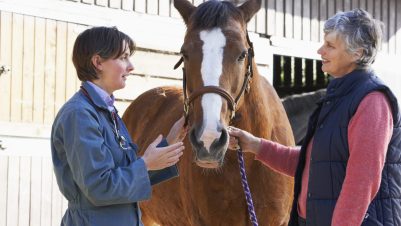
Research by Hartpury University found that home dental care products are currently under-used by dog owners in the UK and recommends that strategies are developed by veterinary professionals to encourage the uptake of dental care at home.
Periodontal disease is prevalent in dogs in the UK, and has many negative consequences for the health and welfare of the affected individual.
Despite techniques and products being available for owners to maintain good oral health, compliance is low.
The study used a questionnaire to investigate dog owners’ awareness and use of dental homecare and the influence of veterinary professionals to establish if further educational intervention is required.
Results revealed a lack of knowledge and performance of dental homecare, suggesting a need for veterinary professionals to provide education for owners on this topic.
A total of 422 participants completed the questionnaire and the results revealed that only 4 percent of owners used a toothbrush daily, while 50.9 percent had never performed toothbrushing and 92 percent had never used dog toothpaste.
Results also revealed that 53.1 percent of respondents said they’d never been recommended to brush/clean their dog’s teeth by a veterinary practice.
Of those who had received a recommendation, 47.4 percent stated it came from the veterinary surgeon, 22.5 percent had received the recommendation from a veterinary nurse; 24.9 percent said it came from both surgeon and nurse; and 5.2 percent said they were unsure.
Of the respondents, 25.7 percent stated that inspecting or looking at all their dogs’ teeth was “very difficult” or “fairly difficult”, while 74.3 percent stated it was “very easy” or “fairly easy”.
Canine behavioural reasons were listed as the main cause for any difficulties experienced.
Owners were asked what they considered to be important for good dental health in dogs. Special dental dog food and dental chews were selected to be of minor importance by 39.7 percent and 36.7 percent respectively, with 33.7 percent rating toothbrushing as very important.
The study highlighted opportunities that veterinary professionals can use to deliver owner education and animal training, which include appointments such as annual boosters, health checks and veterinary nurse-led clinics.
Puppy clinics can also provide a crucial opportunity for educating owners and training of young animals, helping to habituate puppies to having their mouths examined and teeth brushed, which may alleviate behavioural issues that impact toothbrushing in the future.
Other opportunities such as postoperative dental checks and geriatric clinics can be used by veterinary professionals to provide ongoing guidance, support and education on canine dental health to owners.
As results revealed that most instructions from veterinary professionals had been received by owners verbally, with few stating they had received written information or practical demonstrations, veterinary professionals might consider providing these alternative methods in clinics to increase owner recall and compliance.
The acceptance by the animal and owner of procedures such as toothbrushing could be increased by encouraging early and sufficient training, which would also improve owners’ abilities and efficiency.
These recommendations should be considered seriously in order to reduce the difficulties around dental homecare encountered by owners, alleviate time constraints and increase client compliance.
Carol Gray, BVMS, MA, PhD, MRCVS, principal lecturer in veterinary nursing at Hartpury University and one of the research authors said: “It’s clear that a lack of adequate canine dental homecare among dog owners stems from a lack of awareness of the importance of the routine in order to prevent periodontal disease.
“Further education from veterinary professionals would help increase owners’ understanding and performance of dental homecare, which could reduce the potential need for invasive dental procedures. This presents a real opportunity for the industry to make a difference in every way we can.”
(Research carried out by Hartpury University, submitted as part of the Research Excellence Framework (REF) 2021 process, was recognised as world-leading and internationally excellent, placing Hartpury amongst a prestigious group of well-established institutions.)






